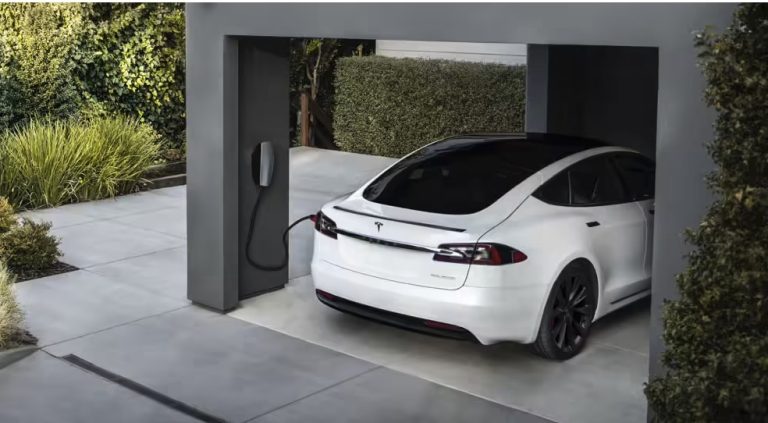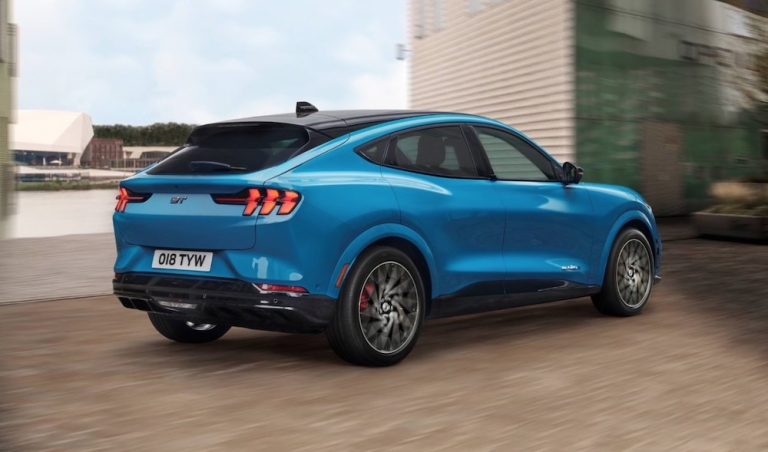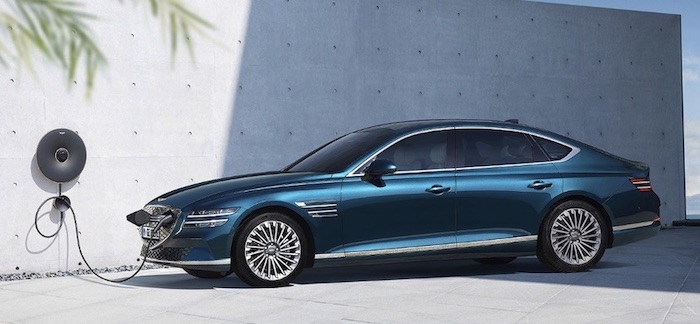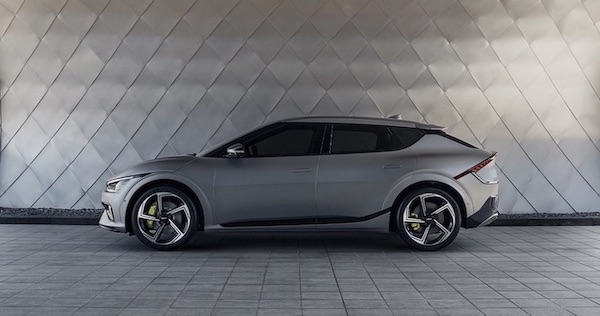Electric Cars: The Basics
For those of you new to zero-emission electric driving, we recommend a read of the following articles:
Sign up to the e-zoomed Electric Living newsletter
The All-Electric Genesis GV70 SUV
Genesis Motor, LLC, though a brand not well known in Ireland, is part of the Hyundai Motor Company, the behemoth South Korean automotive manufacturer. The Genesis brand became an independent luxury marque in 2015. Genesis has currently on offer a number of conventional internal combustion engine (ICE) vehicles and electric vehicles (EVs). However, the company has announced its intention to only develop electric vehicles (EVs) from 2025. Genesis currently has the following EVs on sale:
The all-electric Genesis GV70 mid-sized SUV is a late entrant to the already competitive landscape of premium pure electric SUVs. Though the GV70 battery-electric vehicle (BEV) has much to offer, its limited brand awareness and premium price tag, does pose challenges in the immediate term for the manufacturer.
The GV70 electric SUV has a 77.4 kWh onboard EV battery with a claimed WLTP electric range up to 455 km. In our Best Electric SUVs 2023 list, though many of the EVs have a similar sized EV battery and pure electric range, some competitors offer more than one EV battery size option, to include, a larger EV battery and a longer e-range.
As an example, the all-electric BMW iX SAV is available in two EV battery sizes (76.6 kWh/ 111.5 kWh), giving the consumer a choice based on their specific driving needs. The larger 111.5 kWh EV battery has an electric range up to 594 km (WLTP). Ideally, it would be best to have three EV battery size options, to also include a smaller entry-level EV battery.
Having said that, the GV70 e-SUV 77.4 kWh EV battery offers versatility, for both, city and motorway driving. Even adjusting for real-world driving conditions, the GV70 electric should be able to deliver 385 km on a single-charge. Certainly more than sufficient for most driving needs.
For those new to electric driving, it is worth noting that many factors influence the real-world electric car range. Some of these include: driving style, temperature, elevation, wind, rain, road surface, tyre size, onboard services used etc. The GV70 EV also incorporates a heat pump, which further improves the efficiency of the electric vehicle (EV).
The GV70 offers DC charging capability up to 350 kW DC. The EV can be charged from 10% to 80% in 18 minutes using a 350 kW DC charger. At the more commonly found 50 kW DC charger, the GV70 can be charged up to 80% in 73 minutes.
Of course, for most electric car owners, the EV is usually charged overnight, at home. The EV incorporates a 11 kW AC onboard charger as standard. Charging the e-SUV to 100% via a dedicated three-phase EV charger, like myenergi zappi will take up to 7 hours and 20 minutes. However, as most homes in Ireland are restricted to single-phase power supply, the EV will take longer to charge.
We at e-zoomed recommend a ‘topping up’ approach to charging an electric car. It is better for the long-term maintenance of the onboard EV battery. Genesis offers a 8 years or 160,000 km warranty. We also recommend combining an on-site PV system and battery storage, to truly leverage the benefits of zero-tailpipe emission electric driving.
Unlike many of the other pure electric SUVs, the Genesis GV70 has not been developed on a bespoke EV platform. It uses the same platform as the internal combustion engine (ICE) variants. Though such an approach does have its compromises, Genesis has done well to mitigate such limitations.
The exterior styling is attractive, though more traditional, compared to some of the more recent electric SUVs. However, for those consumers keen on a more familiar exterior styling, the GV70 is well suited. The coupe styling also helps improve the efficiency of the vehicle. The EV drag coefficient is 0.29Cd. The interior of the electric SUV is well appointed, as one can expect from an EV at a premium price.
However, a number of features do not come as standard, further increasing the purchase price of the EV. As an example, the EV offers vehicle-to-load (V2L), but only as an option. Using the onboard bidirectional charger, V2L can be used to charge certain electric appliances, like a laptop, smartphone etc. It can also be used to charge another EV. The GV70 V2L is up to 3.7 kW. The V2L can only be used if the onboard EV battery has a charge over 20%. V2L can be used via the external V2L capability or via the internal V2L plug.
Other features on offer, include: battery pre-conditioning, fingerprint authentication, augmented reality navigation, head-up display, touch controller, active road noise cancelling and more. Safety features include: blind-spot collision-avoidance, blind-spot view monitor, forward collision-avoidance assist, lane following assist, lane keeping assist, intelligent front lighting system and more. In terms of practicality, the EV offers ample headroom and legroom for passengers. The EV has a 530 L boot and a 25 L frunk. The frunk is best used for storing the EV cable. The charging port is located at the front of the car, so convenient.
In terms of performance, the all-wheel drive (AWD) GV70 EV can deliver 0-100 km/h in 4.2 seconds (using the boost function). The boost mode delivers 10 seconds of maximum power and acceleration (490 PS (360 KW)). A good performance, given the additional weight of the onboard EV battery (482.3 kg). The EV incorporates ‘smart regenerative braking 2.0′, which automatically adjusts the regen profile based on the driving behaviour, navigation information and traffic conditions. The EV incorporates one-pedal driving, which the manufacturer refer to as ‘i-Pedal’.
Genesis is keen to emphasise its ‘customer centric’ approach to buying and owning an electric car. The company offers a Personal Assistant ‘to support you throughout your purchase and ownership journey. From arranging a test drive at your home; supporting as you select or configure your new car; and helping arrange servicing, they are always on hand and focused on you’. Moreover, the company also offers a 5 year ‘Care Plan’ which includes: warranty, servicing, breakdown and more.
Bottom-line, electric driving is good for the environment and the wallet!
| PROS | CONS |
|---|---|
| Decent electric range | Expensive. Does not offer an entry-level trim |
| Good level of onboard equipment (standard and options) | Limited brand recognition |
| DC charging up to 350 kW DC/ 11 kW onboard AC charger | Available in only one EV battery size |
The All-Electric Genesis GV70 SUV (credit: Genesis)
| At A Glance | |
|---|---|
| EV Type: | Battery-Electric Vehicle (BEV) |
| Body Type: | SUV |
| Engine: | Electric |
| Available In Ireland: | No |
| Variants (1 Option) |
|---|
| Genesis GV70 (from € N/A) |
| EV Battery & Emissions | |
|---|---|
| EV Battery Type: | Lithium-ion |
| EV Battery Capacity: | Available in one battery size: 77.4 kWh |
| Charging: | 350 kW DC rapid charging (10%-80%: 18 mins). Onboard charger 11 kW AC (0%-100% : 7 hrs 20 mins) |
| Charge Port: | Type 2 |
| EV Cable Type: | Type 2 |
| Tailpipe Emissions: | 0g (CO2/km) |
| Battery Warranty: | 8 years or 160,000 km |
| Average Cost Of Residential Charging | |
|---|---|
| Battery net capacity: 16.7 kWh | € 4.00 |
| Battery net capacity: 30.0 kWh | € 7.19 |
| Battery net capacity: 39.2 kWh | € 9.39 |
| Battery net capacity: 45.0 kWh | € 10.78 |
| Battery net capacity: 50.0 kWh | € 11.98 |
| Battery net capacity: 64.0 kWh | € 15.34 |
| Battery net capacity: 71.0 kWh | € 17.01 |
| Battery net capacity: 77.0 kWh | € 18.45 |
| Battery net capacity: 90.0 kWh | € 21.57 |
| Battery net capacity: 100.0 kWh | € 23.97 |
- Note 1: The average cost of residential electricity in Ireland varies depending on the region, supplier and type of energy used. An average for Ireland is 23.97 cents/kWh.
- Note 2: Not all EV manufactures make available the data on net EV battery capacity, and in a number of instances the EV battery capacity advertised, does not state if it is gross or net capacity. In general, usable EV battery capacity is between 85% to 95% of the gross available capacity.
| Charging Times (Overview) | |
|---|---|
| Slow charging AC (3 kW – 3.6 kW): | 6 – 12 hours (dependent on size of EV battery & SOC) |
| Fast charging AC (7 kW – 22 kW): | 3 – 8 hours (dependent on size of EV battery & SoC) |
| Rapid charging AC (43 kW): | 0-80%: 20 mins to 60 mins (dependent on size of EV battery & SoC) |
| Rapid charging DC (50 kW+): | 0-80%: 20 mins to 60 mins (dependent on size of EV battery & SoC) |
| Ultra rapid charging DC (150 kW+): | 0-80% : 20 mins to 40 mins (dependent on size of EV battery & SoC) |
| Tesla Supercharger (120 kW – 250 kW): | 0-80%: up to 25 mins (dependent on size of EV battery & SoC) |
- Note 1: SoC: state of charge
| Dimensions | |
|---|---|
| Height (mm): | 1630 |
| Width (mm): | 1995 |
| Length (mm): | 4715 |
| Wheelbase (mm): | 2875 |
| Turning Circle (m): | 11.5 |
| Boot Space (L): | 530 |
| GV70 EV | |
|---|---|
| EV Battery Capacity: | 77.4 kWh |
| Pure Electric Range (WLTP): | 455 km |
| Electric Energy Consumption (kWh/100km): | 19.2 |
| Charging: | 350 kW DC rapid charging (10%-80%: 18 mins). Onboard charger 11 kW AC (0%-100% : 7 hrs 20 mins) |
| Top Speed: | 235 km/h |
| 0-100 km/h: | 4.2 seconds (with Boost) |
| Drive: | All-wheel drive (AWD) |
| Max Power (PS): | 490 (360 KW) |
| Torque (Nm): | 700 |
| Transmission: | Automatic |
| Seats: | 5 |
| Doors: | 4 |
| Kerb Weight (kg): | 2,310 |
| Colours: | 13 |
| NCAP Safety Rating: | N/A |
Top Reasons To Buy A Battery-Electric Vehicle (BEV)
Never have the reasons to buy a pure electric car been more compelling, than in 2023. The past decade has witnessed a significant maturity of all types of electric vehicles (EVs), to include, battery-electric vehicles (BEVs) and plug-in hybrid electric vehicles (PHEVs).
In particular, BEVs have improved significantly, to include: e-range, styling, performance, choice, availability and more! A BEV, also known as a pure electric car, is propelled using energy stored in an EV battery via an electric motor. While a PHEV uses ‘hybrid technology’, to include, an internal combustion engine (ICE) and an electric motor, to propel the vehicle. A BEV does not use an internal combustion engine!
In terms of zero-emission electric range, the latest generation of all-electric cars can achieve between 200 km to 500 km on a single charge. Some even more. As an example, the all-electric Mercedes-Benz EQE saloon has a claimed electric range up to 618 km (WLTP) on a single charge. We can continue to expect further improvements in battery performance and electric range in the coming years.
In terms of style and performance, we are now spoilt for choice across all budget segments. Even the likes of the famed ultra-luxurious automotive manufacturer, Rolls-Royce Motors Cars has joined the race to the migration to pure electric cars.
The all-electric Rolls-Royce Spectre is a defining chapter in the history of the famed luxury automotive manufacturer, as it migrates to the production of electric cars. From 2030, Rolls-Royce will electrify its entire portfolio of luxury cars. The Spectre is the first production pure electric car, which was announced in September 2021. The launch of the Rolls-Royce Spectre is also a defining moment for the global automotive industry!
| Top Reasons To Buy A Pure Electric Car | |
|---|---|
| Tailpipe emissions: | A pure electric car has zero-tailpipe emissions i.e. improves air quality in the immediate area. |
| Cheaper to ‘charge’ than ‘fill’: | Significantly cheaper to recharge a full EV battery, compared to filling a full tank of petrol or diesel. An EV battery can be charged for as little as€10, while filling a tank of fuel is usually over€100! |
| Cheaper running costs: | Cheaper to drive per km, compared to an internal combustion engine (ICE) petrol/ diesel car. An EV costs less than 10 cents per km to drive. |
| Lower maintenance costs: | Lower maintenance costs, compared to aninternal combustion engine petrol/ diesel car. Pure electric cars have fewer moving parts, so less can go wrong! |
| Lower noise pollution: | Lower noise pollution,compared to aninternal combustion engine petrol/ diesel car. Noise pollution is as detrimental to health, as air pollution! |
| Smoother and quieter drive: | BEVs are in general silent, improving the travel experience in the cabin. Moreover, the delivery of power is smoother, further enhancing the driving experience. |
| Instant torque: | Yes certainly, battery-electric vehicles (BEVs) have better torque performance compared to internal combustion engine (ICE) cars. BEVs can deliver immediate torque. The better torque performance of electric cars, further contributes to the ‘fun factor’ in driving an EV, compared to a conventional car. |
| Vast choice for all budgets: | A vast range of fantastic EV available on sale, for all budgets, body types and aspirations. |
| Government grants: | Attractive government subsidies to support the uptake of electric cars. Take advantage while still available. |
While e-zoomed uses reasonable efforts to provide accurate and up-to-date information, some of the information provided is gathered from third parties and has not been independently verified by e-zoomed. While the information from the third party sources is believed to be reliable, no warranty, express or implied, is made by e-zoomed regarding the accuracy, adequacy, completeness, legality, reliability or usefulness of any information. This disclaimer applies to both isolated and aggregate uses of this information.






























